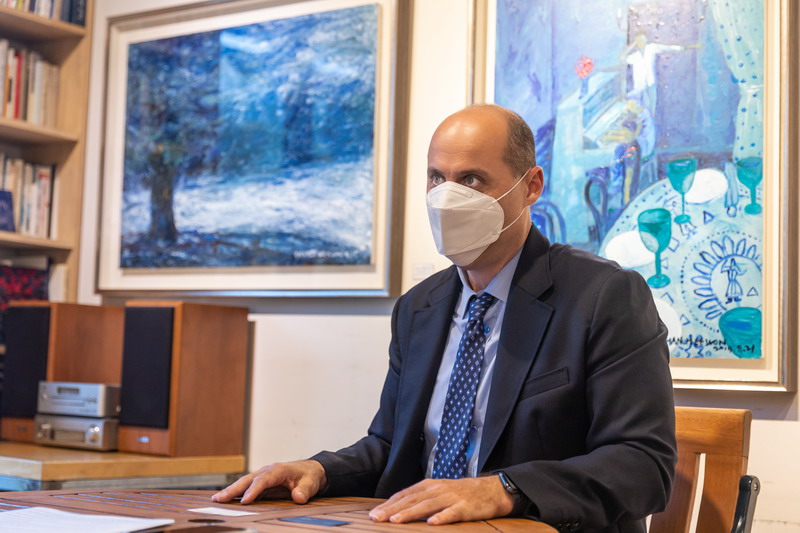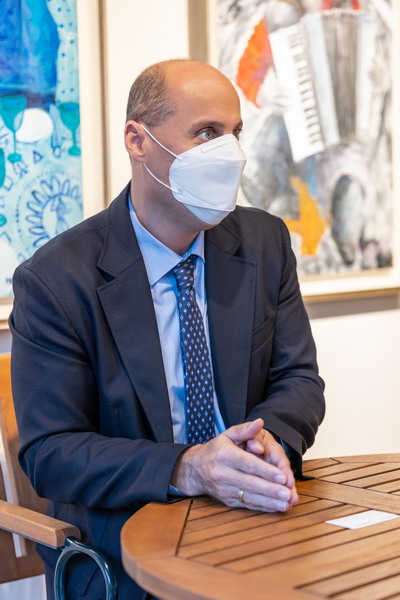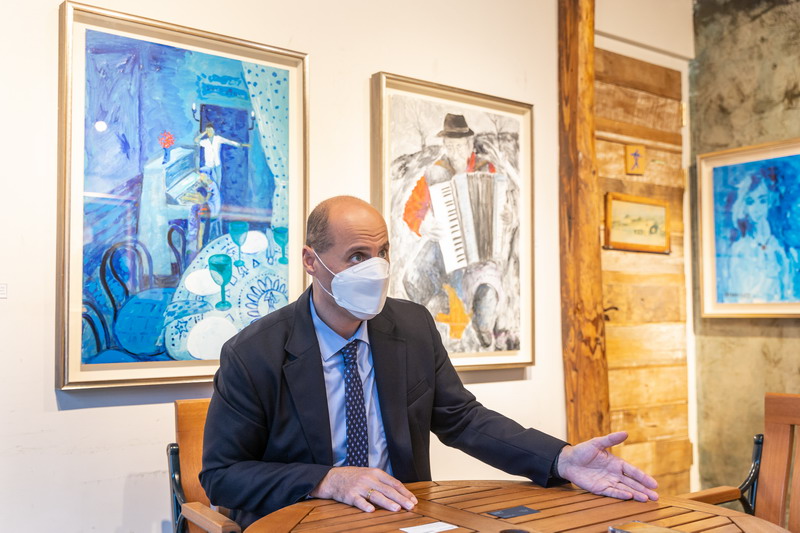In Vino Veritas: Georgian Ambassador Berdzenishvili Visits Gwangju
By Isaiah Winters
Georgia was always the one that got away. I had planned to visit the Caucasian country in the spring of 2020, only to have travel restrictions applied the day after booking my flight. Nevertheless, Georgia recently paid Gwangju a visit when its top representative in South Korea, Ambassador Otar Berdzenishvili, visited this fall. With him were several bottles of Georgian wine that were originally intended for a winetasting event following our interview; however, an uptick in COVID-19 cases meant that the bottles would have to be opened at home as gifts from the Embassy of Georgia. What follows is the remainder of the event, our interview at the Han Heewon Art Museum in Yangnim-dong.
Isaiah Winters (IW): Hello, Ambassador Berdzenishvili. Thanks for taking the time to do this interview for Gwangju News readers. For starters, congratulations on the tenth anniversary of the Georgian embassy in South Korea. What brings you to Gwangju and what wine have you brought us from Georgia?
Ambassador Berdzenishvili: Gwangju is a special place for me personally and for our embassy as well. Since my appointment as ambassador, I have been searching for some special connection close to our values and philosophy, and I think that Gwangju is Korea’s cradle of democracy. That is why I wanted to especially connect with this city. Three years ago, we started some cultural projects to more ambitiously put public diplomacy into action, so we organized one of the most prominent Georgian folk ensembles and brought it to Gwangju. Their singing of polyphonic songs was a wonderful splash of Georgian culture, as were the wonderful wine-tasting events we had here. I think it was quite a blossoming event here in 2018. Through that, we established a foundation for people-to-people connections as well as connections with the Gwangju Metropolitan City government.
Following this, we proposed to make something much bigger. One idea was to make space for movie screenings, so today I opened the Georgian Movie Festival in Gwangju, which is free of charge and purely a public diplomacy project featuring five movies that have been translated into Korean. We have yet another event that is very important. Two years ago, we received news of a prominent artist from Gwangju who visited Georgia for touristic purposes, and he made artistic compositions with inspiration from Georgia, its nature, art, culture, and so on. I immediately grabbed the phone and called artist Han Heewon [see Gwangju News, Nov. 2020]. We planned to make this exhibition bigger in 2020 under the auspices of the embassy and invite all the prominent representatives of Gwangju to a big reception that would serve as “Cultural Days of Georgia,” but the pandemic unfortunately set all our projects back. Still, I am so happy that we are able to have this event today, and am thankful to all the participants – especially the local Koreans, Gwangju residents, and our embassy staff members – because we have been working tirelessly for almost 18 months to make it happen. This was the answer to the first question, so now the second half goes to wine.

I will speak a little bit about wine. First, wine is Georgian DNA in some regards because Georgian history dates back some 8,000 years. Why 8,000 years? Well, when humans found the first traces of wine, that was in the land of present-day Georgia. That is why my country is known as the “cradle of wine.” Even the word “wine” comes from my language – it is called ghvino (ღვინო) and appeared in Latin as vinum. Now, some doubt whether Georgia is the cradle of wine, especially when other European countries are so famous for it. There is a very simply explanation: The earliest vases of wine were found there, the earliest winemaking traditions were found there, and most of all, this tradition of viticulture and winemaking never stopped. It occurred in tandem with human civilization, and from Georgia, this tradition of wine cultivation expanded throughout Eurasia and beyond. Second, Georgia is the only country that has 525 indigenous types of grapes. No other country in the world has more than 70–80 grape types. This means that each plot of land can have different grapes and its own unique home-grown wine. Therefore, Georgia has the greatest diversity of wine, and this has played an important role in the country’s development, including its religious history. That is why today I have brought a very special organic wine made in the traditional way called Mtsvane, and I invite you to taste it.
IW: Many of our readers are curious about the relationship between Georgia and South Korea. Can you share some of the major bilateral achievements over these last ten years?
Ambassador Berdzenishvili: Next year, we celebrate the 30th anniversary of the establishment of diplomatic ties between the republics of Georgia and Korea, and as you have mentioned, this is the tenth anniversary of the opening of the Georgian embassy in Korea. Furthermore, next year the Republic of Korea is reciprocating by opening an embassy of its own in the Republic of Georgia. So, these are some major achievements to begin with.
Also, over the last few years, Georgia has become a hot spot for Korean tourists, and as ambassador, one of my aims has been to create a Croatia-type fever for Korean travelers to Georgia. This is because Georgia has everything Koreans like: It is one of the safest and most diverse countries in the world, with wonderful cuisine, a lot of wine, and some of the best hospitality – all of which Koreans love. That is why Georgia is well known here in Korea.
Before the pandemic, in 2019, Georgia was one of the top destinations for tourism around the world, when we received around 12 million tourists compared to our local population of only 3.5 million. Maintaining and increasing that tourism has been something our embassy has worked tirelessly toward since opening. From that opening ten years ago until today, tourism from Korea has increased 500 percent. We even opened 25 direct charter flights from Korea to Georgia, and in 2020, I was hoping to have a blossoming year where all my work as ambassador would flourish, but then the pandemic hit.
Still, a lot of things are happening – bloggers are going to Georgia, travel bestsellers are being written about my country and, directly concerning your question, we are tirelessly working to increase political connections with Korea. Concerning the latter, what is key is that we have begun a feasibility study on a joint free trade agreement with the Republic of Korea. This is one of the major achievements that our embassy is proudest of, so we are hoping that next year will be another special mark in elevating our countries’ relations.

IW: Can you go into more detail about the FTA taking shape between Georgia and South Korea? What areas of mutual benefit are being explored by each country?
Ambassador Berdzenishvili: For starters, I would like to say that Georgia is one of the most liberal countries in terms of the economy. We are number seven for ease of doing business according to the World Bank, and the Republic of Korea ranks number five, so in the last decade, we have both held top-ten places in this regard. This means Georgia is open to the world, which bears out when you see the special niche Georgia occupies in terms of international trade agreements: We are the only country in our region that has simultaneous free trade agreements with both the European Union and China. We finished our agreement with China and Hong Kong two years ago and are now in deep discussions with India as well. Korea is similarly ambitious in this regard and stands to benefit a lot in the first decade of our agreement, although such an agreement would surely benefit both of us.
IW: Concerning your current visit, are there any specific relations you hope to establish with Gwangju-based institutions or industries?
Ambassador Berdzenishvili: As for now, what we have based in Gwangju is only in the realm of the arts. In Gwangju, we are investing in the cultural sphere and hope to soon have our very own wine ambassador here. [laughs]
IW: While we are on the topic of fruitful exchange, you have been so kind as to share some excellent Georgian wine with us today. Conversely, what is a good gift that South Korean visitors to Georgia can share?
Ambassador Berdzenishvili: Koreans can bring know-how, IT, and their development model, which not only Georgia, but the rest of the world can study because Korea’s the exemplary country for working day and night to make progress. It has the twelfth largest economy in the world, it is the only country that has switched from being a recipient of foreign aid to a donor, and I think that we have a lot to learn. What I especially like about Korea is that people have a mind for work, progress, and success, and this is what I think we should copy.
IW: Georgia and Korea have some interesting parallels that few are familiar with, like with their food culture, unique alphabetic systems, and geopolitical positions. Can you expand on these and any other similarities?
Ambassador Berdzenishvili: Thank you so much – this is one of my favorite areas to talk about when speaking of our countries’ relationship. First, geographically both of us are standing in very unfortunate places. Georgia dates its history back 8,000 years and Korea 5,000 years, and throughout all these years, we have both suffered occupations, invasions, and so on. We both endeavor for peace, and that is why I think Georgians understand Korea’s need for peace more than any other country. We have our own challenges on the ground, too. Twenty percent of my country is occupied by the Russians, and peace is the only feasible resolution to this conflict, so I think we both understand this and share common values.
Second, our two countries have very special identities. When you mention Korea, kimchi is one of the first things to come to anyone’s mind. Of course, brands like Samsung and LG are trademarks associated with Korea, but when it comes to deep culture, kimchi is one of the topics near the top. For Georgians, it is the same thing with wine. That is why both Korean kimjang (김장, kimchi-making) and traditional Georgian winemaking were added to UNESCO’s Intangible Cultural Heritage List at the same time back in 2013. I did a little research into this, and these are some of the oldest traditions among some of the oldest recorded peoples in the world, and both processes use the same fermentation methods. Georgians traditionally put grapes in clay jars and stored them underground, and Koreans did the same with cabbage. These are very deep-rooted similarities, and today we are proudly keeping these uninterrupted traditions alive.

Third, philosophically speaking, why have the Korean and Georgian languages survived? This is a sort of question to your question. Given our broad histories and so many difficult challenges over time, how could we survive? The answer is something I found on my own while reading a lot about Korean history and relating it to Georgian history. The survival DNA of both our peoples is in our languages. Why did they both survive – because they defended their languages. Today our languages are our main survival niche, and without them we would vanish.
IW: Prior to the pandemic, tourism from Korea to Georgia was on the uptick. What aspects of Georgia tend to be most appealing to Korean tourists? Where exactly do they go, and what do they do?
Ambassador Berdzenishvili: For starters, Koreans are keen on hiking, and I think Georgia is a hikers’ heaven. Our 70,000-km2 country has eight of the world’s nine climatic zones, so in a five-hour drive from side to side, you can see the desert, high alpine mountains, and the sea. There is even a project whereby people ski in the mountains and swim in the Black Sea, all in the same day. In addition to our nature, the wine, cuisine, and hospitality of our country are highly attractive to Korean tourists. Thirdly, our safety as a country plays a crucial role for Korean visitors, especially for those seeking to do pilgrimages. Georgia is one of the oldest Christian countries in the world, with a very tolerant view towards other religions. For example, in the heart of the central square in Tbilisi, Georgia’s capital, there is a mosque, a synagogue, a Catholic church, an Orthodox church, and an Armenian church, all of which have run side-by-side together throughout the centuries. That is why a lot of visitors like those from Korea who are interested in pilgrimages find Georgia to be an incredible place.
IW: As ambassador, your motto has been, “More Koreans in Georgia, more Georgians in Korea.” We have heard about how to get more Koreans in Georgia, but how can we expect to get more Georgians here in Korea?
Ambassador Berdzenishvili: We already have a lot of Georgians in Korea because Korea has become very famous in Georgia over the last decade. It is not only about K-pop and the Korean Wave. Besides these, we are enchanted with Korean history and culture. We look up to other countries that fought for their territorial sovereignty and integrity, and still search for peace and harmony today. Technical and industrial expertise is another area – I think something like 70 percent of household appliances in Georgia are from Korea. Another area of interest for Georgians is language. Although Korean is a part of the Altaic language family, it still largely stands alone. Georgian, on the other hand, does not have any other members of its language family, and even today we are still searching. [laughs] Nevertheless, when we Georgians learn languages, among those spoken in East Asia, I think we learn Korean more easily because the pronunciation is very easy for us. Despite our small population of 3.5 million, we have more than 300 Georgian youngsters who have passed the TOPIK exam. The language has become a trend in Georgia. Of course, K-pop and technology do their part to popularize the language as well.
IW: Just across the Caspian, a lot of Uzbek students are coming here, specifically to Gwangju. Is there any opportunity to get Georgian students over here, too?
Ambassador Berdzenishvili: I would like to say that the linkage between Central Asian countries and Korea is very different from that of Georgia. Why are the Uzbek students coming? It is because there are cultural linkages with Korea through many “Koryo-saram,” or Uzbeks of Korean descent. Unfortunately, in this regard, Georgia is really far from Korea. Nevertheless, we have five Georgian students studying in Gwangju with two majoring in the sciences at GIST. I invited them here today, but because of the pandemic, they could not make it. However, I do have one student accompanying me here from Yonsei University. Whenever I travel, I take along students to show them how the embassy works through internships, plus they are participating in translation services and so on. In this way, too, we are further fostering Georgian–Korean relations.
IW: To end on a lighter note, can you recommend us your favorite Georgian wine and a great dish to pair with it?
Ambassador Berdzenishvili: I will recommend a special blend between Georgian wine and Korean cuisine, as this interview is taking place in Gwangju. As most people know, there are three main types of wine: white, rosé, and red. However, the oldest wine, which has been made uninterrupted in Georgia for 6,000 years, is amber wine. It is gold in color, and in the United States they call it “orange wine.” This amber wine kills the notion that white wine should be paired with fish and red wine with red meat. Because it is organic and was made earliest along with our civilization, I think amber wine goes with everything, even Korean barbecue. It goes surprisingly well with pork belly, bibimbap, and other Korean dishes. Some companies are already selling this wine abroad, but here in Korea its availability all depends on the upcoming free trade agreement.
IW: So, it is crucial that we get this done!
Ambassador Berdzenishvili: Yes, it is a priority that we get this done. In the meantime, come to Georgia to try it for yourselves.
IW: Thank you so much for your time.
Ambassador Berdzenishvili: My pleasure.
Photographs by Kim Hillel Yunkyoung.
The Author
Born and raised in San Bernardino, California, Isaiah Winters is a pixel-stained wretch who loves writing about Gwangju and Honam, warts and all. When he’s not working or copyediting, he’s usually looking for something new to shoot and write about. You can find some of his photography on Instagram @d.p.r.kwangju.



